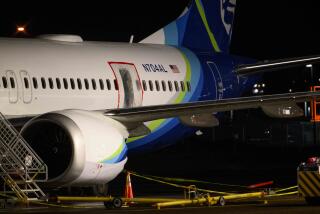New FAA Chief Warns Airlines on Safety
WASHINGTON — T. Allan McArtor, acknowledging public anxiety about air travel safety and airline service, took over Monday as head of the Federal Aviation Administration and warned carriers they must operate safely or be banned from the nation’s airspace.
McArtor, who had been a senior vice president of Federal Express, said also that he would help the FAA improve its image with the flying public.
He added: “Telling a better story cannot be enough. We must take the short-term measures necessary to demonstrate immediate progress to a doubting public.”
During the ceremony at FAA headquarters, McArtor served notice that the airlines’ performance would be watched closely.
“The executive management of every air carrier . . . is hereby on notice,” he told the audience of agency employees, government officials and airline industry leaders. “If you do not comply with your obligations to maintain your fleets and fulfill the obligations of your operating certificates, you will not operate in the national airspace.”
He added a warning to airline employees:
“Pilots, co-pilots, flight engineers and other crew members are also on notice. If you are not medically qualified, if you are not drug-free, if you are not technically proficient, if you cannot demonstrate your skills, you will not fly in the national airspace.”
McArtor, 45, will earn $89,500 annually in his new job. He replaced Donald D. Engen, who resigned July 2, citing personal reasons.
The new administrator said the FAA already was doing a good job, serving 1 million passengers daily in a system in which “99.999% of those flights never experienced anything as minor as an operational error.”
He said that the agency, in cooperation with the airline industry, would begin “a top-to-bottom” review of pilot training. The agency began an investigation of pilot training at Delta Air Lines last week, after a rash of flight crew errors on Delta flights.
McArtor said also that the FAA would accelerate the hiring and training of air traffic controllers. Members of Congress have been complaining that, since President Reagan fired 11,000 striking controllers in 1981, there have been too few workers in the control towers.
McArtor said the agency will try to reduce delays by establishing several routes for planes to take between busy cities.
More to Read
Inside the business of entertainment
The Wide Shot brings you news, analysis and insights on everything from streaming wars to production — and what it all means for the future.
You may occasionally receive promotional content from the Los Angeles Times.










